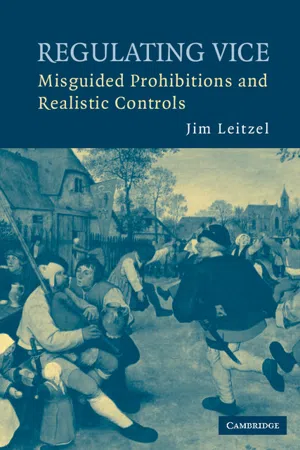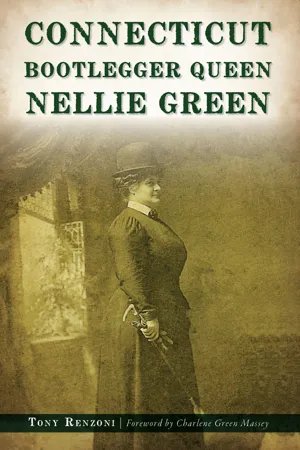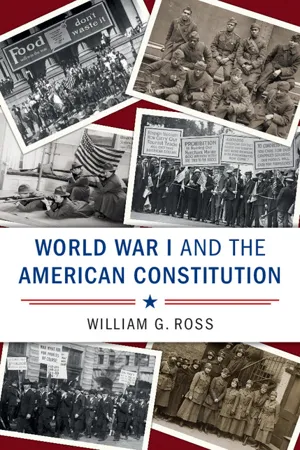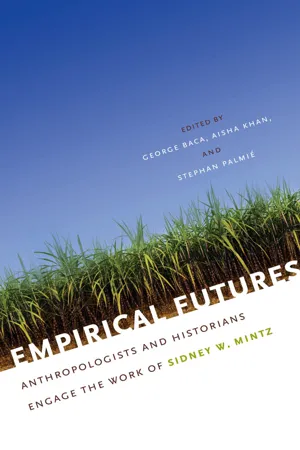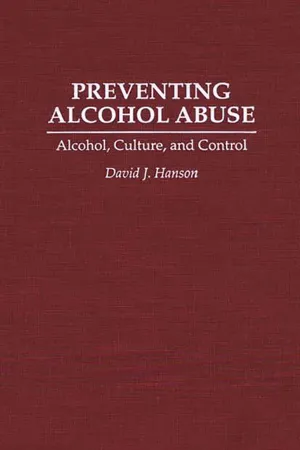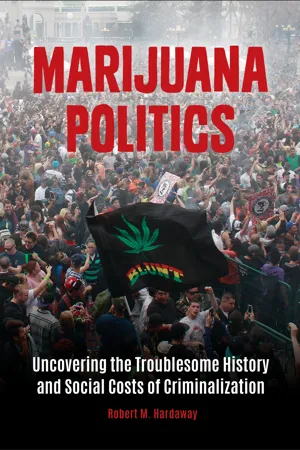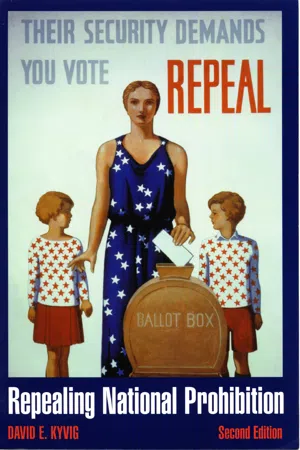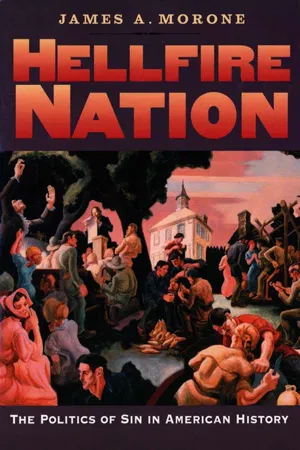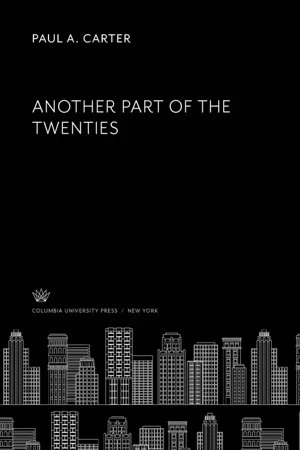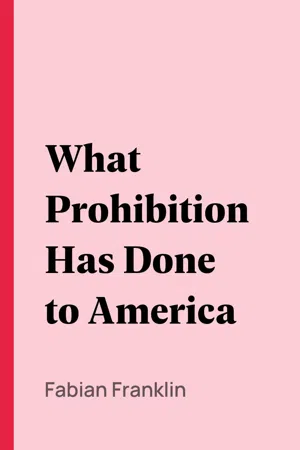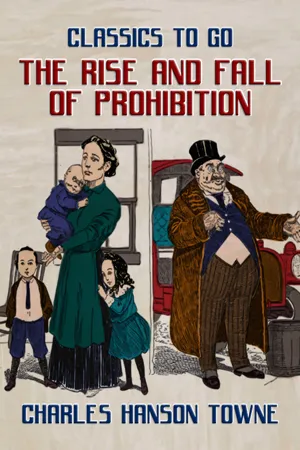History
Prohibition
Prohibition was a nationwide constitutional ban on the production, importation, transportation, and sale of alcoholic beverages in the United States from 1920 to 1933. It was implemented through the 18th Amendment to the Constitution and the Volstead Act. Prohibition led to the rise of illegal alcohol production and distribution, as well as the growth of organized crime.
Written by Perlego with AI-assistance
Related key terms
1 of 5
11 Key excerpts on "Prohibition"
- eBook - PDF
Regulating Vice
Misguided Prohibitions and Realistic Controls
- Jim Leitzel(Author)
- 2007(Publication Date)
- Cambridge University Press(Publisher)
48 Merz (1931, p. 72). Prohibition 109 Prohibition, the measure failed, even though a state-level Prohibition had been adopted. 49 Urban areas in the northern United States were particularly unsym- pathetic to the Prohibition cause. Following the ratification of the Eighteenth Amendment in 1919, Congress needed to formulate legislation to implement the national Prohibition. (The amendment referred to “intoxicating liquors . . . for beverage purposes,” pro- hibiting imports and exports, manufacture, sale, and transportation. The “bever- age purposes” condition was necessary to exempt alcohol intended for indus- trial, medicinal, or sacramental use.) One possibility was that the wartime standard would be maintained, and hence that 2.75 percent beer would still be available. Alternatively, both beer and wine could have been exempt, if “intox- icating liquors” were deemed to refer only to distilled spirits. Congress chose a much stricter standard, however – the implementing legislation, known after the chair of the House Committee on the Judiciary as the Volstead Act, defined any product with an alcohol concentration above 0.5 percent (measured by volume) as an “intoxicating liquor.” To protect homemade alcoholic cider, an exception was built into the Volstead Act (as it had been in the Maine Laws of the previous century) for the rustic fermenter “manufacturing nonintoxicat- ing cider and fruit juices exclusively for use in his home,” and this exception was later interpreted by the courts as applying to homemade wine. 50 While sale was prohibited, purchase, possession and consumption remained legal, so that the alcohol ban during Prohibition approximates what is referred to as “decriminalization” in today’s drug policy debates. 51 In evaluating the effects of Prohibition, perhaps the most important datum is the extent of alcohol consumption during Prohibition, relative to the pre- Prohibition period or the years following repeal. - eBook - ePub
- Tony Renzoni(Author)
- 2017(Publication Date)
- Arcadia Publishing(Publisher)
5 THE Prohibition ACTA great social and economic experiment, noble in motive—Herbert Hoover, thirty-first president of the United StatesAt midnight on Saturday January 17, 1920, the United States went dry. On that day and time, the Prohibition Act took effect, banning the “manufacture, sale, and distribution” of intoxicating liquor. Because of this law, saloons, distilleries and most breweries were forced to close their doors.From its onset, the Prohibition era has intrigued Americans in a number of different ways. Some advocated for a national Prohibition law to curb the negative effects of alcohol abuse, believing it had a devastating effect on the family, especially wives and children. Others have felt (and still feel) that the Roaring Twenties was an exciting, glamorous, spirited time that brought about the independent “new woman.” Still others felt that the Prohibition law was unjust and counterproductive—restricting a freedom they loved and enjoyed—and costly on a financial level.So, how did we get to this historic and controversial moment in American history? Let’s look back at the circumstances surrounding the Prohibition Act, mainly the temperance movement, the enforcement of the Volstead Act and the repeal of Prohibition.Well over one hundred years before the Prohibition Act took effect, organized groups throughout the United States began their pursuit to limit or outlaw the consumption and production of alcoholic beverages. Purportedly, the first temperance group on record in the United States was formed in Litchfield County, Connecticut, in 1789.Last call. Crowds rush to purchase liquor before the Prohibition law took effect. Walter P. Reuther Library, Archives of Labor and Urban Affairs, Wayne State University.These organizations began to champion the cause for temperance, arguing that alcohol abuse was morally corrupting and destroying families—both personally and economically. This organized effort demanding restrictions on alcohol became known as the temperance movement. - eBook - PDF
- William G. Ross(Author)
- 2017(Publication Date)
- Cambridge University Press(Publisher)
5 Prohibition of Alcohol Without the war, the nation might have been spared “Prohibition,” the divisive 14-year national ban on the sale of alcoholic beverages that has become a byword for widespread lawlessness and louche morality. Although the passionate and innovative crusade to prohibit liquor, wine, and beer had triumphed in approximately two dozen states and a multitude of counties before 1917, the war rapidly facilitated national restrictions on alcohol that culminated in the enactment of the Eighteenth Amendment on January 16, 1919. The need to conserve food and to encourage sobriety during a time of national crisis provided both political and constitutional justifications for wartime restrictions on alcohol that eased the path of the amendment, which also benefited from growing public acceptance of federal regulatory power and animus against German Americans, who were powerful opponents of Prohibition. Moreover, as one historian has aptly observed, support for Prohibition “derived substantial stimulus from the general atmosphere of public dedication and self-denial bred by the war effort.” 1 The Prohibition movement originated in the early nineteenth century, when many Americans became alarmed about the pervasiveness of alco- holism and intoxication in a society in which distilled and fermented beverages often were safer than water or milk. Temperance gravitated into the theology of many Protestant churches and became part of the antebellum reform movement that advocated abolition of slavery, public education, prison reform, women’s rights, and other humanitarian 1 William F. Swindler, Court and Constitution in the 20th Century: The Old Legality, 1889–1932 (The Bobbs-Merrill Company, Inc., 1969), 252. 186 measures. By the 1850s, social reformers had gone beyond advocacy of abstention to urge legal restrictions on alcohol. By the start of the Civil War, 11 states and numerous counties and towns had banned distilled spirits. - eBook - ePub
Empirical Futures
Anthropologists and Historians Engage the Work of Sidney W. Mintz
- George Baca, Aisha Khan, Stephan Palmié, George Baca, Aisha Khan, Stephan Palmié(Authors)
- 2009(Publication Date)
- The University of North Carolina Press(Publisher)
ABSTINENCE AND POWERTHE PLACE OF Prohibition IN AMERICAN HISTORY JANE SCHNEIDER /This essay accepts the premise that formal colonization is a poor yardstick for imperial reach; that the United States became an industrial-capitalist empire largely (although not exclusively) by other means. And it experiments with an additional idea: that it is instructive to approach the great migrations to the United States from southern and eastern Europe as a variant of colonial conquest whose associated traumas of labor exploitation, cultural repression, and racism touched off struggles of profound historical significance, comparable in a way to the struggles that unfolded in western Europe’sformal colonies.Here I focus on an otherwise difficult to comprehend struggle: the enactment of alcohol Prohibition and the related empowerment of organized crime.As we will see, alcohol Prohibition was a pet project of descendants of the first immigrants—Anglo-Saxon Protestants from England—who sought to control the labor, behavior, and entry of subsequent immigrant groups. Leading up to and following World War I, WASP evangelicals, temperance activists, and organizations such as the Anti-Saloon League won legislative majorities at the county, state, and national level favorable to passing quite punitive laws against gambling, prostitution, alcohol, and narcotics. Indeed, no less than a constitutional amendment, the Eighteenth, forbade the manufacture and distribution of all alcoholic beverages. Ratified in 1919, the Eighteenth Amendment was put into effect in 1920 by the Volstead Act, which took the further step of defining as “liquor” anything with more than 5 percent alcohol, thus including beer and wine, unless intended for sacramental, scientific, or mechanical purposes.Not repealed until 1933, Prohibition created a bonanza for law-breaking entrepreneurs, many of them immigrants. Among these, a network of Italians, leveraged by connections to Old World organized crime, became notorious gangsters. In effect at least some of America’s “internal colonial subjects” (a concept distinct from “internal colonialism - eBook - PDF
Preventing Alcohol Abuse
Alcohol, Culture, and Control
- David J. Hanson(Author)
- 1995(Publication Date)
- Praeger(Publisher)
4. The Volstead Act, passed by Congress to enforce the Eighteenth Amendment, attempted to prevent illegal trade in alcohol by means of fines and imprisonment (Kobler, 1973, p. 13). 5. This view extends back to early history and is reflected in the teachings of Judaism and Christianity as well as in societies around the world. It was expressed by a pioneer in the socio-cultural approach, Robert Bales, when he wrote that "... it is necessary at the outset to avoid confusion between the degree to which alcohol is used in a given culture and the degree to which it creates problems in that culture . . . (Bales, 1946, p. 480). 6. Ideally, children learn at home from good parental role models within a supportive family environment. 7. While there is overwhelming consensus that Prohibition was a failure, there is not unanimity: Prohibition did not fail. On the contrary, it was a tremendous success. . . . [It] brought significant gains to society as a whole and made life more livable for many American families. . . . America prospered economically during the Prohibition period . . . it actually brought about a marked decrease in crime of all kinds . . . (A Methodist editor, 1970). More recently, the federal Office for Substance Abuse Prevention (Resnik, 1990) has described Prohibition as a success in protecting Americans from the "dangerous drug of alcohol," as have some control-of-consumption writers (for example, Gross, 1983, p. 8; Single, 1988, p. 337). The WCTU, the Prohibition Party, the Anti-Saloon League (now known as the American Council on Alcohol Problems) and other groups continue to promote a return to temperance. 8. Keller asserts: Fifty years after the end of Prohibition, we are being advised to enact inhibition. Along with the scientists, the alcoholismists-with still mainly alcoholics in their ranks and leadership-are in full cry against alcohol. - eBook - ePub
Marijuana Politics
Uncovering the Troublesome History and Social Costs of Criminalization
- Robert M. Hardaway(Author)
- 2018(Publication Date)
- Praeger(Publisher)
Social commentators began to note the hypocrisy of politicians who defied the Prohibition laws in private while professing support in public. In more recent decades, U.S. presidents have admitted to using marijuana privately and yet have still publicly supported Prohibition on cannabis.Today, criminalization of marijuana use deprives the government of untold billions in tax dollars that are diverted toward nonproductive criminal uses—as they were during Prohibition. Although it is impossible to precisely determine the effects of criminalization of drug use on the economy, the economic loss of billions of dollars—just when government programs such as Social Security and Medicare compete for scarce dollars from a deficit-ridden treasury—is staggering. The 18th Amendment was passed by the one of the largest majorities in American political history and prohibited the production, distribution, and sale of all alcoholic beverages, including wine and beer. In 1917, it was approved by a vote of 65–20 in the U.S. Senate and 246–95 in the House, and the consequent amendment was then ratified by 45 of the 48 states within 25 months (only 36 states were needed for ratification).4 When Prohibition’s enforcing legislation, the Volstead Act, was vetoed by President Woodrow Wilson for technical reasons on October 27, 1919, his veto was overridden by Congress by a vote of 176–5 in the House and 65–20 in the Senate.5The Origins of ProhibitionThe American temperance movement can be traced to a widely reported sermon against the sins of drunkenness—or intemperance—delivered by Reverend Increase Mather of New England in 1673. Ministers of such religious denominations as the Methodists, Presbyterians, and Congregational Church followed this call with their own intemperance sermons. Many church leaders demanded total abstinence from alcohol from all members of their congregations. Because such calls for voluntary abstinence had only limited effect among churchgoers and were widely disregarded by those outside the church, they were soon followed by demands for laws enacted and enforced by the state. - eBook - ePub
Repealing National Prohibition
Second Edition
- Hans P. Krings(Author)
- 1996(Publication Date)
- The Kent State University Press(Publisher)
1 ADOPTING NATIONAL ProhibitionThe crusade to abolish the use of alcoholic beverages through an amendment to the Constitution hit the United States like a whirlwind in the second decade of the twentieth century. In November 1913 the Anti-Saloon League of America first publicly appealed for a Prohibition amendment. By January 1919, scarcely five years later, Congress had approved and forty-four state legislatures had ratified the Eighteenth Amendment, which proclaimed:A tremendously significant social reform affecting the lives of millions had suddenly become part of the nation’s rarely altered basic law.1. After one year from the ratification of this article the manufacture, sale, or transportation of intoxicating liquors within, the importation thereof into, or the exportation thereof from the United States, and all territory subject to the jurisdiction thereof for beverage purposes is hereby prohibited.2. The Congress and the several States shall have concurrent power to enforce this article by appropriate legislation.3. The article shall be inoperative unless it shall have been ratified as an amendment to the Constitution by the legislatures of the several States, as provided in the Constitution, within seven years from the date of the submission hereof to the States by the Congress.Proponents of the so-called dry law faced little organized resistance as they marched to their triumph. Only brewers, distillers, and other commercial interests made strenuous efforts to block the reform. Individuals and groups offended by the challenge to their ethnic cultural traditions or by the limitation of their right to choose what to drink objected to the national liquor ban, but they lacked the channels and agents to give their protest focus and strength. New opposition to the Eighteenth Amendment began to form, however, in the midst of the Prohibitionist victory in response to the law itself, the manner of its adoption, and the political assumptions upon which it was based. The reaction against this important constitutional innovation, therefore, can only be understood in light of the circumstances of national Prohibition’s creation. - eBook - PDF
Hellfire Nation
The Politics of Sin in American History
- James A. Morone(Author)
- 2008(Publication Date)
- Yale University Press(Publisher)
C h a p t e r 1 1 Prohibition and the Rise of Big Government M Y great-grandfather, Vincenzo Morone, made two barrels of wine every year during Prohibition. He cooked up a pretty good zinfan-del for everyday use and a sweet muscatel for company—apparently the guests got pretty dreadful stuff. Vincenzo always insisted that his wine was perfectly legal. Prohibition, he used to say, never forbade homemade wine you drank with friends. Was he right? Or were the Morones another Prohibition-era family on the wrong side of the law? These kinds of details got hammered out in the Volstead Act, the law that implemented the Eighteenth Amendment. The Volstead Act Intoxicating The Volstead Act pressed righteousness against political compromise. Wayne Wheeler, the hard-line leader of the ASL, claimed credit for drafting the bill. Congressman Andrew Volstead, a Republican from Minnesota, in-sisted he was the real author.They both deserve credit. Plenty of hands marked the measure as it whipped through Congress. The very first question stirred up trouble. The Eighteenth Amendment prohibited “intoxicating beverages.” But just what was intoxicating? The amendment did not say. Many Americans assumed that they would get the wartime status quo; light beer and wines of up to 2.75 percent alcohol. Gover-nor Al Smith assured New Yorkers that light beverages were not “intoxicating.” Prohibition aimed to control the hard, degrading stuff that temperance forces had rallied against so long and hard—who needed home protection from light beer? Congress surprised the moderates. The Volstead Act pegged intoxicating at anything more than 0.5 percent alcohol. The really serious states already had fixed their Prohibition laws at this bone-dry level. The victorious drys did not intend to suffer the irony of a Prohibition amendment that actually loosened liquor controls in their own strongholds. - eBook - PDF
- Paul A. Carter(Author)
- 2019(Publication Date)
- Columbia University Press(Publisher)
CHAPTER V Prohibition and the Democratic Faith ARE YOU a bit disappointed not to find some beer in our dining rooms? The question was one any foreign visitor to the United States in 1921 had to expect. Albert Einstein fielded it gracefully. I cannot say alcohol is as bad as people think it is, he mildly replied. But nevertheless: Prohibition shows the strength of your democratic Government against private interests. In a corrupt State this could not be done. Do you consider it against personal liberty to take liquor away? the persistent interviewer asked. How could that be in America? the scientist innocently re-plied. You have a republic. You have no dictator who makes slaves of people. Nothing that is done by a democratic Govern-ment could be done against freedom. That statement may tell us less about American life in the twenties than it does about the democratic idealism of Albert Ein-stein. Rarely today do we consider Prohibition as having been an affirmation of democratic principles; in the twenties it was regu-larly attacked as a denial of them. And yet, the European visitor to these shores could have found many Americans who justified the Noble Experiment as a natural extension of their national ideals. 86 Prohibition In the words of James H. Timberlake, Middle America had enacted Prohibition in the first place out of an earnest desire to revitalize and preserve American democracy. Like other efforts to revitalize and preserve democracy at about the same time, such as Woodrow Wilson s declaration of war against Germany, that crusade was destined for repudiation. Taking effect at mid-night on January 16, 1920, the Eighteenth Amendment marked the opening of a decade when Americans realized that any for-merly existing democratic common front had been shattered. - eBook - ePub
- Fabian Franklin(Author)
- 2005(Publication Date)
- Perlego(Publisher)
A law punishing drunkenness, which is a public nuisance, comes under the head I have been speaking of; a law forbidding a man to drink for fear that he may become a drunkard does not. And in fact the Prohibitionists themselves instinctively recognize the difference, and avoid, so far as they can, offending the sense of liberty by so direct an attack upon it. It is safe to say that if the Eighteenth Amendment had undertaken to make the _drinking_ of liquor a crime, instead of the _manufacture and sale_ of it, it could not have been passed or come anywhere near being passed. There is hardly a Senator or a Representative that would not have recoiled from a proposal so palpably offensive to the instinct of liberty. Yet precisely this is the real object of the Eighteenth Amendment; its purpose and, if enforced, its practical effect is to make it permanently a crime against the national government for an American to drink a glass of beer or wine. The legislators, State and national, who enacted it knew this perfectly well; yet if the thing had been put into the Amendment in so many words, hardly a man of them would have cast his vote for it. The phenomenon is not so strange, or so novel, as it might seem; it has a standard prototype in the history of Rome. The Roman people had a rooted aversion and hostility to kings; and no Caesar would ever have thought of calling himself _rex_. But _imperator_ went down quite smoothly, and did just as well.In addition to its being a regulation of individual conduct in a matter which is in its nature the individual's own concern, Prohibition differs in another essential respect from those restrictions upon liberty which form a legitimate and necessary part of the operation of civil government. To put a governmental ban upon all alcoholic drinks is to forbid the _use_ of a thing in order to prevent its _abuse_. A Of course there are fanatics who declare--and believe--that _all_ indulgence in alcoholic drink, however moderate, is abuse; but to justify Prohibition on that ground would be to accept a doctrine even more dangerous to liberty. It is bad enough to justify the proscription of an innocent indulgence on the ground that there is danger of its being carried beyond the point of innocence; but it is far worse to forbid it on the ground that, however innocent and beneficial a moderate indulgence may seem to millions of people, it is not regarded as good for them by others. The only thing that lends dignity to the Prohibition cause is the undeniable fact that drunkenness is the source of a vast amount of evil and wretchedness; the position of those who declare that all objections must be waived in the presence of this paramount consideration is respectable, though in my judgment utterly wrong. But any man who justifies Prohibition on the ground that drinking is an evil, no matter how temperate, is either a man of narrow and stupid mind or is utterly blind to the value of human liberty. The ardent old-time Prohibitionist--the man who thinks, however mistakenly, that the abolition of intoxicating drinks means the salvation of mankind--counts the impairment of liberty as a small matter in comparison with his world-saving reform; this is a position from which one cannot withhold a certain measure of sympathy and respect. But to justify the sacrifice of liberty on the ground that the man who is deprived of it will be somewhat better off without it is to assume a position that is at once contemptible and in the highest degree dangerous. Contemptible, because it argues a total failure to understand what liberty means to mankind; dangerous, because there is no limit to the monstrosities of legislation which may flow from the acceptance of such a view. Esau _sold_ his birthright to Jacob for a mess of pottage which he wanted; these people would rob us of our birthright and by way of compensation thrust upon us a mess of pottage for which we have no desire. - eBook - ePub
- Charles Hanson Towne(Author)
- 2020(Publication Date)
- Otbebookpublishing(Publisher)
The same paper has this to say, editorially, on “The Achilles Heel of Prohibition”:“The United States ‘easily holds first place in the manufacture of statutory law,’ declared Mr. Emery in his speech. ‘A single Congress,’ he added, ‘usually receives some 20,000 bills. Many of the States consider not less than 1000. During the year 1921, 42 legislatures were in session. Judging from past years, Congress and the States annually enact an average of 14,000 statutes. The State and National legislation of a single year recently required more than 40,000 pages of official print.’“Certainly, it is time for a Congress on limitation of legislation.”“National Prohibition has not been long on trial. The final effect of the fundamental change in our Constitution involved in the enactment of the Eighteenth Amendment has not been, and cannot be, yet determined. All the evidence which we have seen, however, tends to show that the nation is better off materially and physically under Prohibition than under the system which permitted the sale of intoxicating beverages. Benefits to be derived from the elimination of the drink traffic did not wait upon our National experiment for demonstration. They have been obvious for centuries in the experience of peoples from whom alcohol has been barred by religious authority. There remains, however, a very serious problem confronting the defenders and advocates of national Prohibition. It is the problem of maintaining the respect for law and order and that mental habit of ready acceptance of legal enactments which is one of the strongest bulwarks of applied democracy.“We do not doubt for a minute that the majority of the people of the United States are in favor of national Prohibition. Even in great cities where the liquor interests have had their stronghold we suspect that the number of men and women who would vote for national Prohibition, were it put to the popular test, is much larger than the ‘wets’ are willing to admit. We say this in order that this editorial may not be considered as an argument for the repeal of Prohibition amendment by those who are working for such ends upon premises which we regard as distinctly unsound.“To say that there is a majority in favor of the amendment does not imply that there is not a large and active minority in favor of its repeal. The greatest problem confronting advocates of national Prohibition lies in the fact that this large minority has not accepted the amendment with that good faith and willing spirit which we have grown to look upon as characteristic of the spirit of the losers in our political controversies. There have been great changes in our government prior to the enactment of the Prohibition Amendment, but almost invariably these changes, once effected, have been acquiesced in by their most ardent opponents. We are not speaking of individual violators, but of the public attitude towards the law.
Index pages curate the most relevant extracts from our library of academic textbooks. They’ve been created using an in-house natural language model (NLM), each adding context and meaning to key research topics.
